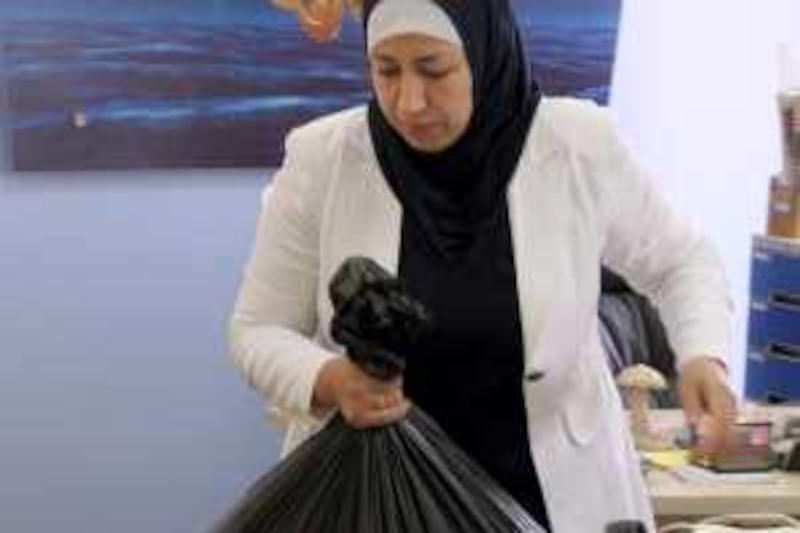RAMALLAH // The normally bustling and hectic newsroom of the Al Jazeera bureau in Ramallah is quiet these days, with desks empty and staff lounging in easy chairs watching TV and drinking coffee. The Qatar-based satellite network is unable to function in the West Bank after Salam Fayyad, the Palestinian Authority prime minister, on Wednesday ordered the network to suspend its operations and commissioned Ahmed al Mughni, the PA's attorney general, to proceed with a legal case against the network for "incitement and false information". The order was issued after the network on Tuesday aired accusations by Farouq Qaddoumi, the second-in-command of the PLO, that implicated Mahmoud Abbas, the PLO leader and PA president, and Mohammad Dahlan, a legislator and erstwhile Gaza strongman, in the death of Yasser Arafat, the former Palestinian president. PLO officials strongly denied Mr Qaddoumi's accusations, denials that were run on Al Jazeera, but that did nothing to prevent the ban. Critics have deplored the PA decision and urged the Palestinian Authority to overturn it. "It's a big mistake," said Walid Omari, Al Jazeera's Israel and Palestinian territories bureau chief, yesterday. Mr Omari denied the network was at fault in its reporting of the accusations. "Instead of letting it pass, the PA's decision reignited interest in the story. If the intention had been to bury the story, the decision to stop us working was very stupid." Mr Qaddoumi's accusations had featured in several news bulletins, but the network ran afoul of the PA with one of its programmes, Behind the News, in which a panel discussed the accusations live on air. The PA said its position was not properly represented there, something Mr Omari conceded, but said it was because a senior PA official, who had agreed to appear, "disappeared" 30 minutes before the live programme aired and no suitable replacement could be found. Mr Omari also said the network had given ample time for others who rejected Mr Qaddoumi's claim in their main news bulletins. "We did nothing wrong. Mr Qaddoumi is the PLO's number two. What he says is important. We gave room for those who disagreed. We didn't make this up," he said. Ghassan Khatib, head of the Jerusalem Media and Communications Centre, agreed that the PA mishandled the situation. "It was an overreaction, it was not professional and it simply caused more damage to the PA," he said. Whatever the merit of the PA's accusation that the Behind the News programme was unbalanced, Mr Khatib said, "the decision was illegal". Human Rights Watch and the International Federation of Journalists both denounced the decision, the former saying it showed the PA had "red lines" on press freedom. "Are they going to silence the media every time someone reports something they don't like? Prime Minister Fayyad should reverse this punitive step," Sarah Leah Whitson, Middle East and North Africa director at HRW, said on Thursday. The federation on Friday called the decision a "serious violation" of press freedom and urged the PA to counter adverse news in a "professional and transparent manner". The federation has been generally critical of the state of press freedoms in the occupied Palestinian territories. Last month, the IFJ issued a statement condemning what it called a crackdown on the media, specifically the arrest of seven journalists by the PA in the West Bank and one in Gaza. The media watchdog described the situation as a result of the "war of words" between the PA and Hamas in Gaza and said journalists had been the "victims of ruthless attempts to control and use media for propaganda purposes". Mr Omari, who has reported on the Palestinian-Israeli conflict since the mid-1990s, agreed that the situation for journalists had significantly deteriorated in the past few years. He traced it to two particular events, the 2006 parliamentary elections, which Hamas won, and the violence in June 2007 when the Islamist movement ousted PA security forces from Gaza. "Arafat was not easy, but under him press freedoms were expanding. Since 2006 it has gotten worse," Mr Omari said. "But we are not involved in the Fatah-Hamas fighting. We are only reporting on it." The PA decision to stop Al Jazeera broadcasting also came as a surprise to many observers. The government, led by Mr Fayyad, is widely seen as a technocrat administration unlikely to take such steps and the impetus for the decision likely came from Mr Abbas's office. This "delicate" political situation, in the words of Mr Omari, may account for what is seen as an overreaction by the PA. The PA will likely overturn its decision in the coming days, even if it proceeds with the court case. But damage to the image of the western-backed government under Mr Abbas has already been done. okarmi@thenational.ae
TV news bureau goes off the air
The Palestinian Authority has pulled the plug on Al Jazeera, accusing it of incitement and spreading false information after a controversial broadcast.

Editor's picks
More from the national




